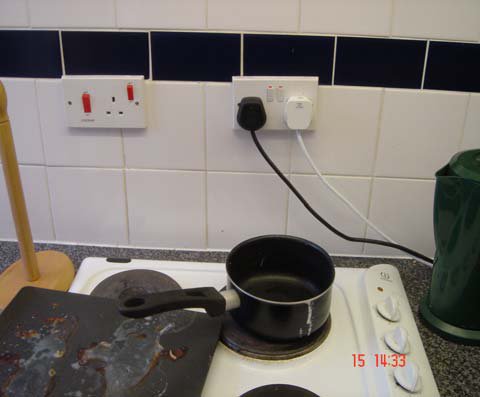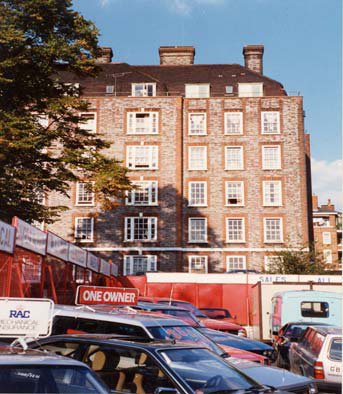

HHSRS 5/06
25 (IDeA - 01)
June 2006
hot surfaces etc
Yes
Yes
No
No
Flames,
Vulnerable age
Related hazards
Persons aged under 5 years
Fire risk
Multiple locations
Secondary hazards
Second floor one bedroom flat in a
block constructed in 1934
DESCRIPTION OF HAZARDS
Dwelling:
Background: In the seven storey block there are 60 flats with a mixture of one and two bed self-
contained units. A kitchen in the one bed flats is 2.2m in length by 2m in width. A modernization
programme was undertaken by the landlords in 1985 which included replacement work surfaces,
the installation of electric hob unit with separate oven and the provision of additional power points
in the kitchen. The electric cooker point and an additional power point have been installed in the
location identified in the top left hand photograph, there is another single electrical socket at a
lower level.
LIST OF RELEVANT MATTERS
LIKELIHOOD & OUTCOMES
Secondary Hazards
# Compounding matters
-
None
-
A
B
-
-
a
Unprotected hot surfaces
3
c
b
Unguarded open flames
c
Hot water to bath
-
d
Hot water to sink
-
e
Thermostatic taps
-
f
Kitchen layout
2
g
Inadequate separation
-
h
Disrepair
-
i
Inadequate space
2
Outcomes
a
Burns associated with hot plates on hob
2
b
Poor location of electrical sockets
3
Key
3
Seriously defective
2
Defective
1
Not satisfactory
-
Satisfactory/NA
1
The potential for electrical cables to other
appliances burning on the hot plate
25 (IDeA - 01)
June 2006
HEALTH AND SAFETY RATING SYSTEM SCORES
LIKELIHOOD
Low
High
1 in 32
Av 920-45 Non-HMO: 306
32
< 4200 2400 1300 750 420 240 130
75
42
24
13
7.5
4
2.5
1.5 >
Justification
A lack of adequate space within the kitchen contributes to an increased likelihood. To
access the cooker box socket and adjacent sockets, it is necessary to reach over the hob.
The location of sockets increases the likelihood of tipping hot pans of the hob when either
using the sockets or via cables to the equipment connected to the sockets. It is less likely
that clothing will catch fire reaching across electric hot plates compared to gas hobs and
the vulnerable age group of persons under 5 are less likely to reach across the hob.
OUTCOMES
%
Av 1920-45: 0.2
Class I
0.2
< 0.05 0.15 0.3
0.7
1.5
3
7
15
26
38 >
Av: 0.0
Class II
0.1
< 0.05 0.15 0.3
0.7
1.5
3
7
15
26
38 >
Av: 15.0
Class III
21.5
< 0.05 0.15 0.3
0.7
1.5
3
7
15
26
38 >
Av: 84.8
Class IV
78.2
< 0.05 0.15 0.3
0.7
1.5
3
7
15
26
38 >
Justification
Because of the location of the cooker hob and sockets and lack of space within the kitchen
the Class II harm is increased above the average as the pans could be knocked over onto
a child in the small kitchen leading to more severe scalds.
Av. 1920-45 Non-HMO: 24
RATING
A
B
C
D
E
F
G
H
I
J
Score:
292
RATING SCORES AFTER IMPROVEMENT
IMPROVE
Likelihood to
1 in
320
Outcomes to
0.2
0.1 21.5 78.2
%
Justification
Re-siting the sockets to a more suitable location away from the hob would return the
likelihood to nearer the average although the size of the kitchen would remain the same
and the harm outcomes would remain the same.
Av: 24
NEW RATING
A
B
C
D
E
F
G
H
I
J
Score:
29
Av Nos
Average likelihood and health outcomes by persons aged under 5 years,1997-99.